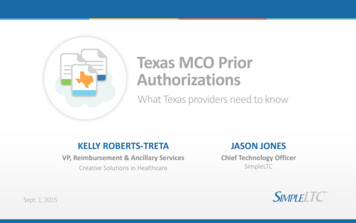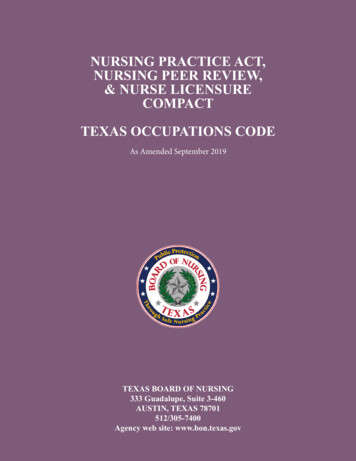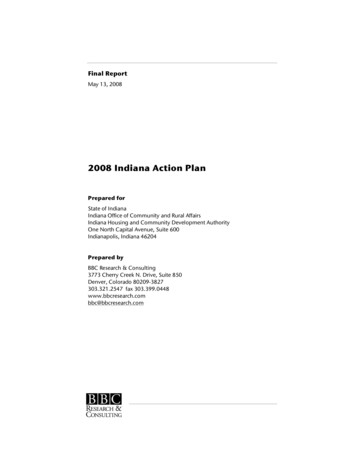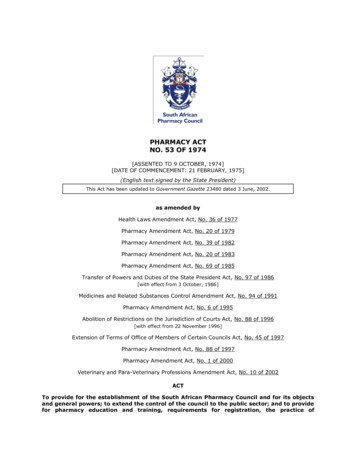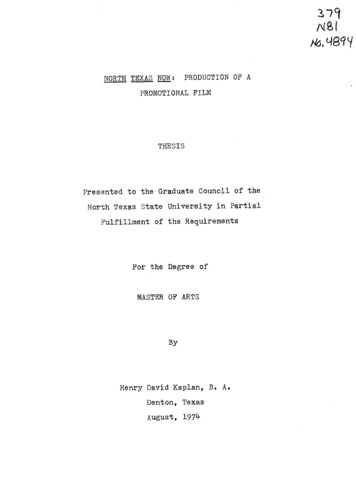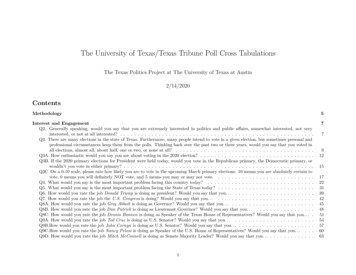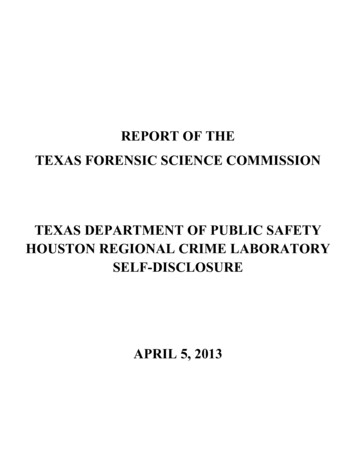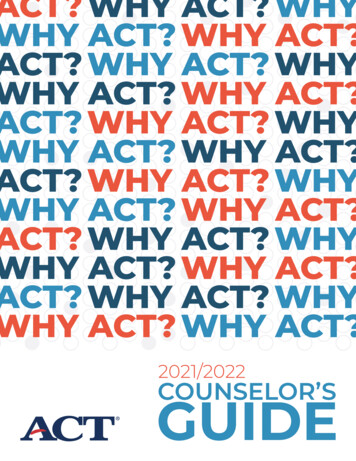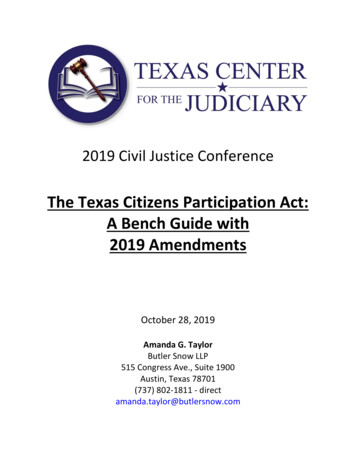
Transcription
2019 Civil Justice ConferenceThe Texas Citizens Participation Act:A Bench Guide with2019 AmendmentsOctober 28, 2019Amanda G. TaylorButler Snow LLP515 Congress Ave., Suite 1900Austin, Texas 78701(737) 802-1811 - directamanda.taylor@butlersnow.com
TABLE OF CONTENTSINTRODUCTION .12019 AMENDMENTS .1DEADLINES & PROCEDURES .2MOTION . 2NOTICE OF HEARING . 4DISCOVERY. 4RESPONSE . 6REPLY. 7HEARING . 7EVIDENCE/PROOF . 9RULING . 10Deadline. 10Disposition . 11FINDINGS . 12APPEAL . 14STAY PENDING APPEAL . 15BURDEN SHIFTING . 16OVERVIEW OF BURDENS AND DISPOSITION . 16STEP 1: MOVANT . 17Quantity of Proof . 18Legal Action . 18Nexus . 20Rights Protected . 21STEP 2: NON-MOVANT . 29Exclusions . 29Exemptions . 30Procedural Defect . 34Constitutional Challenges . 35Prima Facie Case . 35STEP 3: MOVANT . 37MONETARY RELIEF . 38TO MOVANT. 38
Attorneys’ Fees . 39Costs and Expenses . 40Sanctions . 40TO NON-MOVANT . 41
INTRODUCTIONThe Texas Citizens Participation Act (TCPA) was enacted in 2011 and codified under Chapter 27 of theTexas Civil Practice and Remedies Code (CPRC). Significant amendments were made in 2019, coveredbelow.The TCPA allows parties to seek swift dismissal of certain “legal actions,” and provides for monetaryrelief depending on the outcome. It is often referred to as the “Anti-SLAPP” statute because its aim is todismiss “Strategic Lawsuits Against Public Participation.” To that end, the the TCPA’s stated purpose is“to encourage and safeguard the constitutional rights of persons to petition, speak freely, associatefreely, and otherwise participate in government to the maximum extent permitted by law”; and at thesame time, “protect the rights of a person to file meritorious lawsuits for demonstrable injury.” CPRC §27.002.However, the TCPA has been interpreted very broadly and applied to a wide variety of cases beyondthose involving “constitutional rights.” See below, “Burden Shifting, Step 1: Movant”; see also CPRC §27.011 (mandating a liberal construction); Youngkin v. Hines, 546 S.W.3d 675, 681 (Tex. 2018) (Justbecause “the TCPA professes to safeguard the exercise of certain First Amendment rights” does notmean “that it should only apply to constitutionally guaranteed activities.”). Based on this broadinterpretation, the TCPA has become a “game changer” in Texas civil litigation, increasingly present onthe dockets of state courts across Texas.This Bench Book is intended to assist members of the Texas Judiciary and their staffs in evaluatingprocedural and substantive issues presented by TCPA motions under both the prior and 2019-amendedstatutory text. Case updates through mid-October 2019 are included throughout. However, this BenchBook does not comprehensively cover all TCPA case authority, and should not be used as a substitute forbriefing provided by the parties in any particular case.2019 AMENDMENTSH.B. 2730 (86th R.S.) was signed into law by Governor Abbott, making several amendments to the TCPA.The amendments are not retroactive but instead apply “only to an action filed on or after the effectivedate” of September 1, 2019. H.B. 2730 §§ 11-12 (emphasis added).The statute does not define whether “action” means a “legal action,” a “suit,” a “claim” within a suit, orsomething else. Hence, a future dispute may arise about the intended meaning of the 2013 effectivedate. For example, if a suit was originally filed in August 2019 alleging only a breach of contract claim,and then an amended petition was filed on September 2, 2019, adding a common law fraud claim, whichversion of the statute would apply to the amended petition? If the amended petition is considered an“action,” meaning the 2019 amended version applies, then the defendant could not use a TCPA motionto dismiss the fraud claim because the amended version exempts common law fraud claims from thescope of legal actions subject to dismissal. CPRC 27.010(a)(12). But if the prior version applies, then thefraud claim would be subject to dismissal if movant could otherwise satisfy his burden at Step 1(addressed below).-1-
Perhaps the most notable feature of the 2019 amendments is what did NOT change. Many had pushedfor the scope of the statute to be revised so that it would allow for dismissal of only claims that infringedupon one’s exercise of a “constitutional” right to speak, petition, or associate. Several proposed billsincluded this revision. None of them made it out of Committee. Instead, the enacted amendmentsmake a variety of “line item” changes to the scope of the TCPA’s application.As detailed below under “Step 1” and “Step 2” of the burden-shifting analysis, the definitions of “legalaction,” “matter of public concern,” and “association” were changed; exclusions and exemptions to legalactions were added; the movant’s burden of proof was modified; and governmental parties wereexpressly precluded from using the TCPA.The 2019 amendments also made a variety of changes to the TCPA’s deadlines and procedures, bringingthese motions to dismiss more in line with summary judgment motions; and changes were made to themonetary relief available to successful movants under the TCPA.Separate from the amendments, another big development in 2019 was the issuance of the Fifth Circuit’smuch anticipated decision in Klocke v. Watson, 936 F.3d 240 (5th Cir. 2019), holding that the TCPA doesnot apply in federal court in a diversity case. The Court held that the TCPA is procedural and conflictswith FRCPs 12 and 56, which are valid. As a result of this ruling, plaintiffs with claims potentially subjectto dismissal under the TCPA may be motivated to file in federal court (if able to satisfy diversityjurisdiction) rather than state court.DEADLINES & PROCEDURESThe TCPA sets forth specific deadlines (with caveats) for filing the motion, setting a hearing, andobtaining a ruling. In 2019, deadlines were added for serving a notice of hearing and filing a response.“If a party fails to satisfy these requirements, then it forfeits the statute’s protections.” WightmanCervantes v. Hernandez, No. 02-17-00155-CV, 2018 WL 798163, at *4 (Tex. App.—Fort Worth Feb. 9,2018, pet. denied).MOTIONA TCPA movant is required to file its motion on or before the 60th day from the date the “legal action”was served. The court may extend this deadline on a showing of good cause. For actions filed on orafter September 1, 2019, the parties may extend the deadline upon mutual agreement. Failure totimely file a TCPA motion is a proper basis for its denial.§ 27.003(b): A motion to dismiss a legal action under this section mustbe filed not later than the 60th day after the date of service of the legalaction. The parties, upon mutual agreement, may extend the time to filea motion under this section or the court may extend the time to file amotion under this section on a showing of good cause. (2019)-2-
It is well-established that the 60-day deadline does not re-start upon the filing of an amended pleadingthat does not alter the essential nature of the claims asserted. E.g., Maldonado v. Franklin, No. 04-1800819-CV, 2019 WL 4739438, at *3-6 (Tex. App.—San Antonio Sept. 30, 2019, no pet. h.) (engaging indetailed comparison of original and amended pleadings to determine which claims were newly-assertedsuch that portion of TCPA motion was timely); Mancilla v. Taxfree Shopping Ltd., No. 05-18-00136-CV,2018 WL 6850951, at *3-4 (Tex. App.—Dallas Nov. 16, 2018, no pet.) (TCPA motion was untimely filed inresponse to a second amended petition, which did not substantially reformulate the claims but merelyadded specificity to the prior allegations, while maintaining the essential nature of the claim. Becausemovants had notice of this claim in the prior petition, their alleged need for protection under the TCPAwas triggered at that time.); In re Estate of Check, 438 S.W.3d 829, 836-37 (Tex. App.—San Antonio2014, no pet.) (“[I]n the absence of new parties or claims, the deadline for filing a motion to dismisswould run from the date of service of the original ‘legal action.’” It “would lead to absurd results” toconclude otherwise).Waiving or accepting service under TRCP 119, or making a general appearance under TRCP 120, has thesame effect as being served with citation and, hence, may trigger the 60-day motion deadline even inthe absence of actual service. Skidmore v. Gremillion & Co. Fine Art, Inc., No. 01-18-00829-CV, 2019 WL1119401, at *4-5 (Tex. App.—Houston [1st Dist.] Mar. 12, 2019, pet. filed) (TRCP 120); Grant v. PivotTech. Sols., Inc., 556 S.W.3d 865, 885-86 (Tex. App.—Austin 2018, pet. filed) (TRCP 119).For purposes of extending the motion deadline, the Third Court relied on the meaning of “good cause”used “in other contexts”: a failure caused by “accident or mistake, not intentional [conduct] or theresult of conscious indifference.” Under this meaning, movant failed to show good cause to extend hismotion-filing deadline where he provided no explanation for why he could not have sought dismissalsooner. Campone v. Kline, No. 03-16-00854-CV, 2018 WL 3652231, at *6 (Tex. App.—Austin Aug. 2,2018, no pet.); see also Torres v. Pursuit of Excellence, Inc., No. 05-18-00676-CV, 2019 WL 2863866 (Tex.App.—Dallas July 2, 2019, pet. filed) (date on certificate of service is prima facie proof of when thedeadline began running, and a movant claiming that a “technical difficulty” prevented timely filing mustput on evidence to overcome the presumed deadline shown by that certificate).The First Court of Appeals held that, where the motion was one day late and the trial court expresslynoted in the order that the motion was timely filed, it constituted an implied finding of good cause.Schimmel v. McGregor, 438 S.W.3d 847, 856 (Tex. App.—Houston [1st Dist.] 2014, pet. denied). On theother hand, the Ninth Court held that, where the motion was one day late and the movant did notrequest an extension or make any effort to demonstrate good cause for his delay, the trial courtproperly denied his TCPA motion on the basis of untimeliness. Shiflet v. Port Arthur Patrolmen's HuntingClub, No. 09-19-00012-CV, 2019 WL 4064573, at *1 (Tex. App.—Beaumont Aug. 29, 2019, no pet. h.).A movant who fails to expressly request a continuance of the motion deadline based on good causeand/or does not obtain a ruling on its request waives the argument. See Maldonado v. Franklin, No. 0418-00819-CV, 2019 WL 4739438, *6 (Tex. App.—San Antonio Sept. 30, 2019, no pet. h.) (denyingmovant’s request that the appellate court grant an extension based on her original request in thatforum on the basis of good cause; the reference to “court” in Section 27.003(b) is limited to the trialcourt, and movant waived request for an extension there); Miller Weisbrod, L.L.P. v. Llamas-Soforo, 511S.W.3d 181, 194 (Tex. App.—El Paso 2014, no pet) (failing to ask explicitly for an extension results in awaiver of the ability to file a motion to dismiss beyond the 60-day deadline).-3-
NOTICE OF HEARINGThe prior version of the statute did not include a “notice of hearing” requirement. However, the 3-daydefault under TRCP 21 and any local rule remain applicable. The parties should be expected todemonstrate professional courtesy in coordinating the hearing date and providing fair notice.Effective September 1, 2019, the statute was amended to add a notice of hearing requirement:§ 27.003(d): The moving party shall provide written notice of the dateand time of the hearing under Section 27.004 not later than 21 daysbefore the date of the hearing unless otherwise provided by agreementof the parties or an order of the court.Although there are not yet any appellate opinions interpreting this new language, you can anticipatethat summary-judgment jurisprudence will be instructive because the requirement under the TCPA isnow similar to TRCP 166a(c) (“Except on leave of court, with notice to opposing counsel, the motion andany supporting affidavits shall be filed and served at least twenty-one days before the time specified forhearing.”). See, e.g., Vertex Servs., LLC v. Oceanwide Houston, Inc., No. 01-18-00125-CV, 2019 WL3783115, at *7 (Tex. App.—Houston [1st Dist.] Aug. 13, 2019, no pet. h.) (granting summary judgmenton grounds added in reply would deprive nonmovant of hearing and mandatory 21–day notice ofhearing required by Rule 166a(c), which serves the purpose of providing nonmovant adequate notice ofall claims that may be summarily disposed of and the specific grounds on which the movant relies).DISCOVERYFiling a TCPA motion automatically suspends all discovery in the case unless the trial court rules to allowspecified and limited discovery.1 Such a ruling provides a basis to continue the hearing for up to 120days. These provisions were not amended in 2019:§ 27.003(c): Except as provided by Section 27.006(b), on the filing of amotion under this section, all discovery in the legal action is suspendeduntil the court has ruled on the motion to dismiss.§ 27.006(b): On a motion by a party or on the court's own motion andon a showing of good cause, the court may allow specified and limiteddiscovery relevant to the motion.1See In re Spex Grp. US LLC, No. 05-18-00208-CV, 2018 WL 1312407 (Tex. App.—Dallas Mar. 14, 2018, orig. proc.)(filing a TCPA motion automatically stays discovery only, not other trial court proceedings; the trial court may granta TRO while the TCPA motion is pending).-4-
§ 27.004(c): If the court allows discovery under Section 27.006(b), thecourt may extend the hearing date to allow discovery under thatsubsection, but in no event shall the hearing occur more than 120 daysafter the service of the motion under Section 27.003.It is not sufficient for the nonmovant to make a “contingent” request for discovery filedcontemporaneous with its TCPA response to be heard at the same time as the TCPA motion. The TCPA“does not authorize the trial court to permit discovery after concluding that the plaintiff’s evidence fallsshort.” Landry’s Inc. v. Animal Legal Def. Fund, 566 S.W.3d 41, 69 (Tex. App.—Houston [14th Dist.]2018, pet. filed). Hence, the trial court “did not abuse its discretion in denying the conditional motionfor discovery.” Id.; see also ETC Texas Pipeline, Ltd. v. Addison Expl. & Dev., LLC, No. 11-18-00152-CV,2019 WL 3956114, at *6 (Tex. App.—Eastland Aug. 22, 2019, no pet. h.) (nonmovant waived complaintthat trial court erred in denying discovery by waiting until day of hearing to make request and failing toobtain a ruling).“Good cause” to conduct discovery was not shown, and thus trial court did not abuse discretion indenying motion to conduct discovery, where nonmovant requested discovery simply “so it may be usedat the hearing on the motion to dismiss” without providing any explanation of “how particularly theinformation he sought was relevant to defending against [the] motion to dismiss.” Mazaheri v. Tola, No.05-18-01367-CV, 2019 WL 3451188, at *5 (Tex. App.—Dallas July 31, 2019, no pet. h.).Similarly, the trial court did not abuse its discretion in denying a motion to conduct discovery on adefamation claim where the alleged statement underlying nonmovant’s claim “on its face” was notcapable of a defamatory meaning. Baumgart v. Archer, -- S.W.3d --, No. 01-18-00298-CV, 2019 WL2621744 (Tex. App.—Houston [1st Dist.] June 27, 2019, no pet. h.) (ruling “probably did not cause therendition of an improper judgment”).In a similar opinion showing a subtle but important distinction, the majority in Mustafa v. Pennington,No. 03-18-00081-CV, 2019 WL 1782993 (Tex. App.—Austin Apr. 24, 2019, no pet.) held that the trialcourt did not err in denying discovery because the nonmovant could not establish a prima facie case onhis claim. Id. at *4. Finding this somewhat circular (because the purpose of discovery is to enable anonmovant to meet that burden), the concurring opinion clarified that discovery was properly deniedbecause nonmovant could not assert a viable claim as a matter of law in any event. Id. (J. Goodwin,concurring).Regarding the hearing deadline, the Fifth Court of Appeals held that, where trial court granted motion toconduct discovery, it was implied that hearing date could be extended to 120 days even without anexpress order granting continuance. Forget About It, Inc. v. BioTE Med., LLC, No. 05-18-01290-CV, 2019WL 3798180, at *4 (Tex. App.—Dallas Aug. 13, 2019, no pet. h.).The scope of discovery is not defined in the statute, and has not been well-defined by the courts. In reSpex Grp. US LLC, No. 05-18-00208-CV, 2018 WL 1312407, at *4-5 (Tex. App.—Dallas Mar. 14, 2018, orig.proc.). “Discovery is relevant to the motion to dismiss if it seeks information related to the allegationsasserted in the motion. Some merits-based discovery may also be relevant, however, to the extent itseeks information to assist the non-movant to meet its burden to present a prima facie case for eachelement of the non-movant’s claims to defeat the motion to dismiss.” Id. Although requests forproduction and deposition testimony (limited to certain topics and a reduced duration) have been-5-
permitted, “[a] party would [] not need multiple or lengthy depositions or voluminous written discoveryin order to meet the low threshold to establish a prima facie case.” Id. (holding trial court allowedoverly-broad discovery; remanding with instructions to conduct another hearing and narrow the scopeof the permitted discovery for TCPA purposes).Several recent opinions consider the scope of discovery allowed under section 27.006(b), reachingdiffering results. See Brown Sims, P.C. v. L.W. Matteson, Inc., --S.W.3d--, No. 04-18-00596-CV, 2019 WL4739439, *10 (Tex. App.—San Antonio Sept. 30, 2019, no pet. h.) (trial court did not abuse its discretionin allowing three depositions, limited in scope, and tailored to topics relevant to the motion); Lane v.Phares, 544 S.W.3d 881, 889 n.1 (Tex. App.—Fort Worth 2018, no pet.) (three hour deposition of thedefendant/movant was permitted); In re IntelliCentrics, Inc., No. 02-18-00280-CV, 2018 WL 5289379, *37 (Tex. App.—Fort Worth, Oct. 25, 2018, orig. proc.) (scope of discovery is shaped by the scope of thepleadings; because movant opted to broadly characterize plaintiff’s claims as being based ondefendant’s protected activities under the TCPA, the defendant could not simultaneously attempt tonarrow the scope of the claims for purposes of limiting discovery); In re SSCP Mgmt., Inc., 2019 WL1758502 (Tex. App.—Fort Worth Apr. 22, 2019, orig. proc.) (trial court abused its discretion in permittingoverly-broad discovery, despite fact that the TCPA motion challenged every single element of everysingle claim pled).RESPONSEThe prior version statute did not contain a deadline by which the nonmovant’s response must be filed.Hence, for cases governed by this version, the nonmovant may file its response any time prior to thehearing, including on the day of the hearing. Brown Sims, P.C. v. L.W. Matteson, Inc., --S.W.3d--, No. 0418-00596-CV, 2019 WL 4739439, *10 (Tex. App.—San Antonio Sept. 30, 2019, no pet. h.) (nonmovantswere entitled to file their response with new evidence attached the day before the hearing); MVS Int'lCorp. v. Int'l Advert. Sols., LLC, 545 S.W.3d 180 (Tex. App.—El Paso 2017, no pet.) (because legislaturedid not create a response deadline, court declined to do so by judicial fiat).However, local rules may require an earlier deadline, and trial courts maintain broad discretion tocontrol their dockets, which may include requiring parties to file a TCPA response by an earlier deadline.See Mission Wrecker Serv., S.A. v. Assured Towing, Inc., No. 04-17-00006-CV, 2017 WL 3270358, *3 (Tex.App.—San Antonio Aug. 2, 2017, pet. denied) (trial court did not abuse discretion in sustaining objectionthat response filed 15 minutes prior to hearing was untimely because the absence of a deadline cannotbe used as a tool to ambush opposing counsel).Effective September 1, 2019, the statute was amended to add a response deadline:§ 27.003(e): A party responding to the motion to dismiss shall file theresponse, if any, not later than seven days before the date of thehearing on the motion to dismiss unless otherwise provided by anagreement of the parties or an order of the court.Although there are not yet any appellate opinions interpreting this new language, you can anticipatethat summary-judgment jurisprudence will be instructive because the requirement under the TCPA is-6-
now similar to TRCP 166a(c) (“Except on leave of court, the adverse party, not later than seven daysprior to the day of hearing may file and serve opposing affidavits or other written response.”).REPLYThe TCPA does not include any requirement that the movant file a reply in support of its motion nordoes it set a deadline for doing so. Because the statute previously allowed the response to be filed onthe day of the hearing, it was not feasible to file a reply in most cases. Now that the response must befiled 7-days before the hearing, reply briefing will become more common. The trial court maintainsdiscretion to set a reply deadline by case and/or by local rule.HEARINGThe TCPA hearing must originally be “set” on or before 60 days from the date of service of the motion.This setting may be continued for the hearing “to occur” up to 90 days later based on the court’s docketconditions, or for good cause, or upon the agreement of the parties. Additionally, the hearing may beextended “to occur” up to 120 days later to allow for discovery. These provisions were not amended in2019:§ 27.004:(a) A hearing on a motion under Section 27.003 must be set not laterthan the 60th day after the date of service of the motion unless thedocket conditions of the court require a later hearing, upon a showingof good cause, or by agreement of the parties, but in no event shall thehearing occur more than 90 days after service of the motion underSection 27.003, except as provided by Subsection (c).(b) In the event that the court cannot hold a hearing in the timerequired by Subsection (a), the court may take judicial notice that thecourt's docket conditions required a hearing at a later date, but in noevent shall the hearing occur more than 90 days after service of themotion under Section 27.003, except as provided by Subsection (c).(c) If the court allows discovery under Section 27.006(b), the court mayextend the hearing date to allow discovery under that subsection, but inno event shall the hearing occur more than 120 days after the service ofthe motion under Section 27.003.Effective September 1, 2019, an amendment was made to the court’s deadline to rule on the motion(now calculating that deadline from the date the hearing “concludes”), which indicates that the hearingmay be recessed and reconvened to conclude at some point after the original setting. See CPRC §27.005(a) (discussed further below).When the hearing deadline falls on a weekend, conducting the hearing on the following Monday istimely under the Code Construction Act, Tex. Gov’t Code § 311.014(b), and TRCP 4. Forget About It, Inc.-7-
v. BioTE Med., LLC, No. 05-18-01290-CV, 2019 WL 3798180, at *4 (Tex. App.—Dallas Aug. 13, 2019, nopet. h.).Although the trial court has discretion to conduct a hearing by submission, the statute requires thatmovant timely set its TCPA motion for an oral hearing, at least according to the Fort Worth Court ofAppeals. Wightman-Cervantes v. Hernandez, No. 02-17-00155-CV, 2018 WL 798163, at *3 (Tex. App.—Fort Worth Feb. 9, 2018, pet. denied). Hence, in the absence of an agreement between the parties orpermission expressly granted by the trial court to conduct the hearing by written submission, themovant failed to comply with the statutory hearing deadline by not setting an oral hearing within 60days of filing his motion. Id.; but see Weber v. Fernandez, No. 02-18-00275-CV, 2019 WL 1395796, *3(Tex. App.—Fort Worth Mar. 28, 2019, no pet.) (noting without analysis that the TCPA hearing wasconducted by submission).Trial courts cannot sua sponte rule on a TCPA motion in the absence of a hearing, even if the trial courtbelieves based on its initial review that the motion is “frivolous or solely intended to delay.” Reeves v.Harbor Am. Cent., Inc., 552 S.W.3d 389, 394-95 (Tex. App.—Houston [14th Dist.] June 7, 2018, no pet.)(trial court cannot take “a short-cut around the rest of the statute”). There, the trial court denied theTCPA motion before the nonmovant even filed a response, stating that no briefing or argument wasnecessary because the court perceived the motion as being used to avoid discovery, which hadpreviously been agreed to per Rule 11 and ordered by the court. The Fourteenth Court reversed andremanded for consideration of the TCPA motion on its merits because trial courts must consider theevidence presented and analyze all three steps of the burden-shifting framework before ruling. Id.Although a trial court cannot refuse to conduct a hearing, the burden is on the movant to timely requestthat the hearing be conducted. Where a movant made reasonable requests for the hearing to beconducted and the trial court refused to comply, mandamus relief was granted. In re Herbert, No. 0519-01126-CV, 2019 WL 4509222 (Tex. App.—Dallas Sept. 19, 2019, no pet. h.). On the other hand,where nothing in the record showed that the trial court actually denied a setting or that the movanttook action to object to the lack of a hearing, the movant waived any right to pursue dismissal under theTCPA. Vodicka v. Tobolowsky, No. 05-17-00727-CV, 2019 WL 1986625, at *5 (Tex. App.—Dallas May 6,2019, no pet.); see also RPM Servs. v. Santana, No. 06-19-00035-CV, 2019 WL 4064576 (Tex. App.—Texarkana Aug. 29, 2019, no pet. h.) (movant forfeited rights under TCPA by failing to timely set ahearing; without a hearing, motion was not overruled by operation of law, and ap
This Bench Book is intended to assist members of the Texas Judiciary and their staffs in evaluating procedural and substantive issues presented by TCPA motions under both the prior and 2019-amended . and time of the hearing under Section 27.004 not later than 21 days before the date of the

